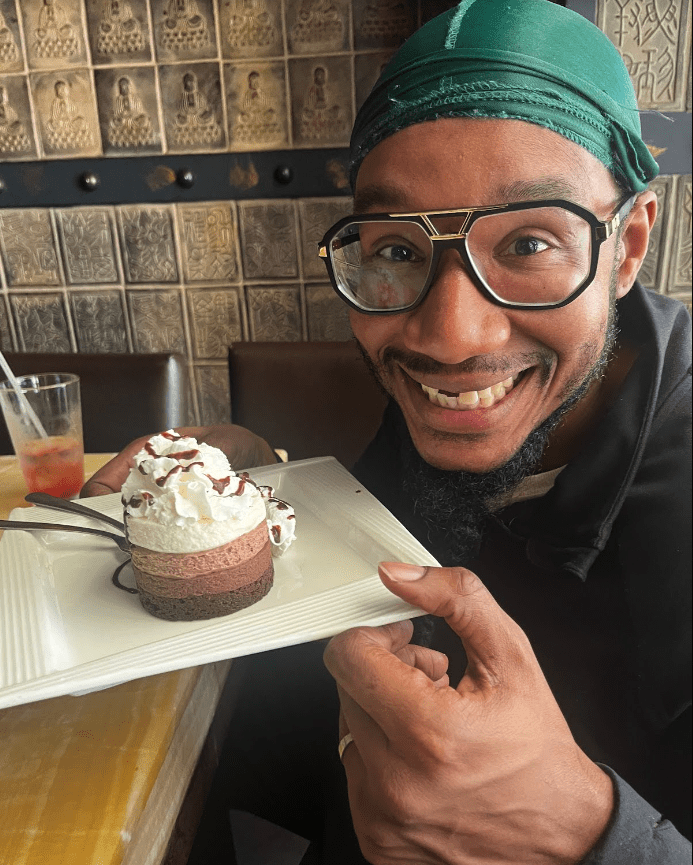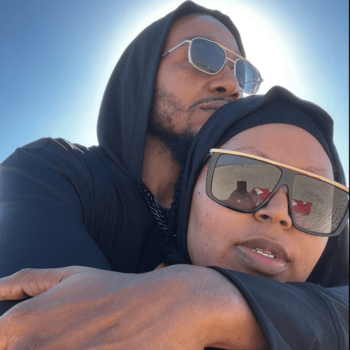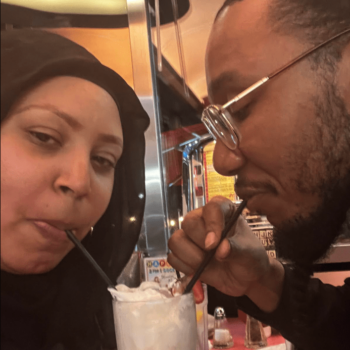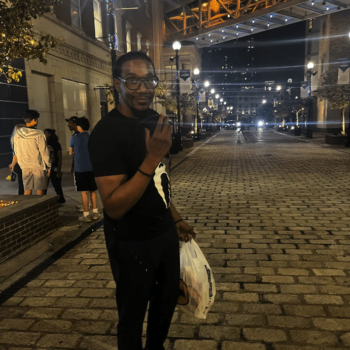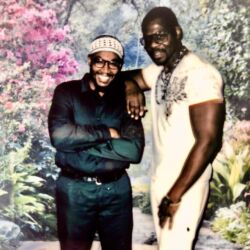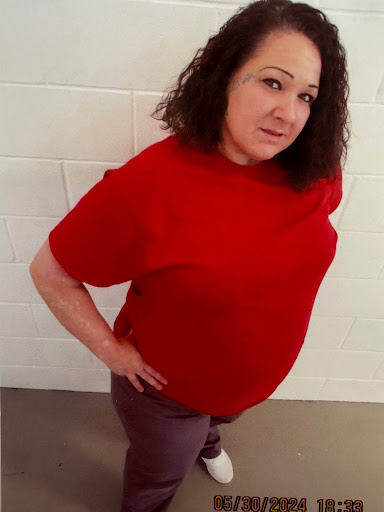Andrew “Smiley” Spencer
Released after 17 years
Diane: How are you?
Andrew: Excellent, it’s so good to be alive and be free.
Diane: How long have you been out?
Andrew: Four months.
Diane: Walk us through how you found out you were found suitable.
Andrew: I found out because of the school. There’s a policy that can help you get released six months early. Getting my bachelor’s degree pushed my date up by six months to March 30th, instead of September 30th.
Diane: Was your sentence indeterminate or did you go to Pro Board?
Andrew: Yeah, I had an indeterminate sentence. I had a flatbed.
Diane: Tell us about the moment you found out.
Andrew: My counselor told me to come to the office and fill out the paperwork. I had to make sure I had proof of place of residency. Once they approved it, it was a go. When that day came, you know, it was surreal. I started having anxiety and panic attacks. I went to Hudson Link, a transitional service. They helped me get my GED, my associate, my bachelor’s, my Columbia credits. But I got nauseous sitting inside the car because I haven’t moved around like that for so long. And then seeing my wife and my kids, seeing how big they got, you know, actually being able to hug them and hold them for a long period of time was so surreal. And then we’re on the highway and seeing how everything changed on the New York City side.
Brooklyn looked totally different, it had sky risers, big buildings and skylines. It’s breathtaking. The first place I went was to see one of my friends at Drop Studio. Then, I went to the mosque, made my salat, my prayers while thanking my creator for helping me come out alive. I came out in the month of Ramadan too, which was a blessed month. And then from there, we went straight to my boy’s studio. When I went to the studio, I laid down my song. I put my makeup on with my character and everything. Then I went home. We walked into the apartment and it felt good to be free, sitting in a little room, seeing my cat Bella, walk around. Me and my son played some PlayStation. I was really good at shooting fire. I love being able to take my son and daughter to school, to eat crusty, flaky lamb patties, that are scrumptious. Next, my mother came from Delaware and I went to see my older brother. Leter, I met my parole officer. They was cool, I was telling them what I was doing as far as my music and employment that I was just basically going to live.
I was starting to find myself being uncomfortable with my wife touching me a lot, because I was so desensitized to being touched. It’s different in prison when your loved one comes to visit. I knew the issue was me, because I knew prison had messed me up. I was also a little frustrated with the cell phone. I also had to adjust to having a cell phone, I’m just now starting to get comfortable with it. It’s fast. I’m trying to send emails, and I learned about these scammers. This has been a very, very different world.
Then on June 11, we were driving on our way back from the Bronx and we saw smoke. We thought an airplane fell into the building, but it was our apartment on fire. Everything went up in smoke, everything, my wife’s wedding dress, my certificates, the books I wrote, everything, the cat, we lost the cat, Bella. I’m just glad that we’ve been able to make it out alive.
Diane: Oh my gosh, Andrew, that is traumatic.
Andrew: It made a hella lot of news. They had to pull all resources from all the fire departments to New York City.
Diane: Did your whole building burnt down?
Andrew: 1420. Noble Avenue in the Bronx on June 11th. 89 units went up. The whole thing was condemned.
Diane: So you’d only been out three months, and you lost everything?
Andrew: Yes. All the families were relocated to an emergency school area. We sat there and filled out the paperwork. Families were scuttled into shelters. They sent me and my wife and kids to a motel out in LaGuardia, not too far from the airport. As soon as we got out of the car, you saw prostitution, you saw drugs, the bottom of the barrel. We saw needles and had to stay there for a week. Then we went to the Bronx, to the 5th Street, Arcadia family shelter. That place was no better because as soon as you got inside, the rats came, they were sitting looking at us as we walked past. And then to make matters worse, they had the same exact bed that I slept in prison.
Diane: No. No.
Andrew: These are the same exact ground beds that my kids and my wife were subject to sleeping on that I slept on in prison.
Diane: How were you coping with this?
Andrew: I stayed focused. I had a counselor, a social worker, and a placement provider. They were supposed to help find us a property, but they couldn’t help us. We had to help ourselves. My wife and I decided we were going to Queens. We were stomping the ground every day to find an apartment. My wife was hoping to establish a clinic. She lost all the equipment she needed to go to work, and my wife also suffers from depression. So that’s, you know, a double win. I said, we got to depend on each other. We got to stand strong. We got to keep moving forward. We can’t give up. Everything is too expensive. We finally found a place in Lefrak city in Queens, and it is beautiful. From the 14th floor, I can see the Freedom Tower. I’m always looking out the window. It’s better than looking out of a prison cage.
Diane: What were some of your emotions?
Andrew: Overwhelmed, not knowing with a fear of the unknown. I could feel the weight on my shoulders. I come from a place of suffering, of loneliness, pain, so when I was free, I couldn’t believe it. I went to prison at 23, I was a baby and came back at 39. Now what are you gonna do? You got books, you got plans, you gonna put up that book, you gonna do your music, you gonna find a job. What are you gonna do, Smiley? This was my dialogue. I needed that to motivate myself. There’s no one else. During COVID, I watched people die and pray. I watched a boy die right in front of me.
Diane: Tell me how fears translated into being free?
Andrew: You don’t want to fail at succeeding. When you get out here, people are not really as forthright about helping you with open arms. They want to see what you want to do first. What I’m doing is so different inside a club, painting my face around a whole bunch of street dudes. It’s not the norm. I’m still fighting. I never stopped fighting. I’m still fighting, That’s what I know how to do. Nothing was handed to me. I had to depend on myself and I got locked up by myself. When I got out of prison, I felt by myself. I can’t bring anybody but me. So I got no time to sit around and think about how I feel. I got two babies and a wife that needs me, not only to protect them, but also to provide for them.
Diane: What do you like doing with your kids now that you’re free?
Andrew: My five year old daughter can use a cellphone better than me. She knows more than me. She’s a dancer and a ballerina. She loves drawing, and singing. She loves candy. She gets her strength from her mother. Now, my son, he’s just a gamer. He loves to play. He likes snacks. I try to take him to play some basketball, but he’s like, I ain’t really into this. But I can beat you with some roadblocks. I definitely have to exercise a lot of patience with them, because I’m not used to being around them.
Diane: What have you favorite thing to do since you’ve been out?
Andrew: I enjoy spending time with my wife and kids. I enjoy sitting and watching cartoons with my son and I enjoy doing my music. I like going to the studio. That’s my tranquility.
Diane: What’s been the hardest thing since you’ve been released?
Andrew: Oh, people don’t really stick by their words. I say that because of the music industry. Music influences a lot of the things from the youth. We study behavior science and I see what they like and what they don’t like or what they’re used to and what they’re not used to. Right now it’s not about talent anymore, it’s about popularity, not talent. It is about who’s popular on social media. The youth is very narcissistic and lack self-worth and morals. A lot of young guys got a million dollars, but they don’t really know much besides violence and spinning the block.
Diane: What’s been the hardest habit to break?
Andrew: I guess the main habit that I had to really adjust to is equating things with prison after every sentence. For example, I talked to my wife about how, in prison, a beautiful container could get people hurt in prison. And then my wife looks at me, not understanding my rationality. Guys don’t have a lot in prison and might worship this thing because he doesn’t have family. All he has is this pretty-looking cup with a New York Giants logo on it. You know what I mean?
Also, a lot of things you say in prison, you can’t say out here because it’s frowned on. People are very sensitive to words. You gotta know what demographic of people you’re talking to and not put people in one box. But I’m watching, I’m learning. You really have to be like a politician and a diplomat out here. You’ve got to be super careful, saying the wrong thing can damage you and your livelihood. Especially if you go viral or something like that for the wrong thing, you might never get a job in America.
Diane: Tell us about the song you recorded.
Andrew: Get this, at the same time the fire situation happened while I was in the shelter, my song came on the radio, “I’m a Hater” is the name of the song. I’m basically trying to base myself in the comic con community. I put the paint on my face, you know, and nobody knows my identity.
Diane: What are you thinking about doing for work?
Andrew: In prison, I had my own sneaker company, but I lost all the sneakers in the fire. Now I had to go back to trying to find a gig. I’m going to be working part-time at a movie theater and today I had an interview with a non-profit for animal protection. I have another interview tomorrow I found through LinkedIn.
Diane: Tell me how your wife feels with you being back home.
Andrew: She can tell you. How do you feel about me being back home?
Wife: Hello. It’s a relief. I mean, when you’re with someone that’s incarcerated, sometimes you feel like you’re incarcerated. It may not be physical, but definitely mental, like this mental prison for me. So when he was released, I was released. It’s been amazing not feeling like a single parent anymore. I have my partner by my side, you know, when we’re dealing with the kids and school functions and stuff. But just having him home, you know, present, I can turn around and see him in the bed. When he first came home, I was just in shock, and I didn’t think it was real. I would just stare at him like, is this really true, is he really here? It’s beyond words. I’m very attached to my husband. He’s literally the other half of me. When I fall short, he pulls me out. We have this really deep bond besides just being life partners, we are friends, too. We had a friendship before we were married. I get a little emotional sometimes talking about him because I love him so much.
Diane: You sound like an incredible woman staying by his side.
Wife: I definitely didn’t have any family support throughout this journey with my children, with myself, with anything. Now that he’s home, he’s such a family. He’s very forgiving. When he was in prison, I felt completely alone.
Diane: Can you share your experience of losing experience to the fire?
Wife: We didn’t have rental insurance and the city did literally nothing for us besides putting us in some crappy shelter. They didn’t help us with housing, they didn’t help us get into a new house. All of that came out of whatever little savings I had to get us started over, to buy new furniture, everything, you know. But we’re starting over together in a new place that’s ours. I let him pick out the bed. I wanted to go with another bed frame. I said, you know what? It’s his home too. I let him pick out the bed. I really don’t know anyone more amazing than him. And I’m not saying that cause he’s my husband, but he really is a genuinely great person. He keeps me focused.
Diane: I would love to know what has been the hard adjustment for you since he’s been out?
Wife: Focusing and multitasking. I’m a very fast-paced person. I can juggle literally 50 things within like a minute—cooking, washing, taking care of our daughter: it’s just natural. The other thing is sometimes he gets frustrated with technology when he’s doing something wrong. I have to tell him to breathe, put the phone down, let’s walk through it together. The phone can be a little distracting for me because I’ll be talking to him and he’s just so deep in the phone. I’m like, did you hear me? He really listens and puts the phone down. The kids and I try to be a little patient with him and not overwhelm him too much with too much of our love. We just wanna love him all day.
Diane: Oh, that’s so sweet. You guys have such a healthy relationship.
Wife: Yeah, he’s my best friend. I’ve known him since I was 13 and over the years he’s become like my best friend.
Diane: Are your kids getting used to having him around?
Wife: The kids got right into it, you know, they love having him around. Because daddy’s a cool one, you know? Easy spoken, gentle. I’m a little bit sterner with them and I expect more from them. My son is 12 and I was doing way more than him at 12. I give him responsibilities because children without responsibility get older and lack skills. He has chores I make him do, and daddy’s a cool relaxer. He’s usually the gentle, gentle giant.
Wife: I do try not to plan everything, but I want to be on schedule to get all the things done.
Diane: Yeah, I am too. We keep the whole thing running, don’t we?
Wife: Yeah, definitely. I think at first my husband was thinking I was crazy because I’m so organized and my son always says, oh, you want everything to look like a museum. We don’t live in a museum. I just like things clean and for things to have a place.
Diane: I like to plan too and plus keeping a clean house clears your mind.
Wife: I put labels on storage containers and my husband when he was unpacking the groceries into the cabinet says, “Oh, let me turn it the right way because you know how mom is.” I’m not really that bad, but he’s joking, although there’s some truth there. I know when the cans are crooked.
Andrew: Hello.
Diane: Your wife sounds absolutely wonderful. You guys are so lucky you have each other. That’s so beautiful. Is there anything you want to add before we hang up?
Andrew: I will be dropping my LP for my album, Boogie Man.
Diane: Congrats! We’ll give a shout out and tell people to listen to it!
Andrew: Thank you and thanks for interviewing me.
Diane: Thank you, Andrew. I appreciate you and wish you a ton of success.

